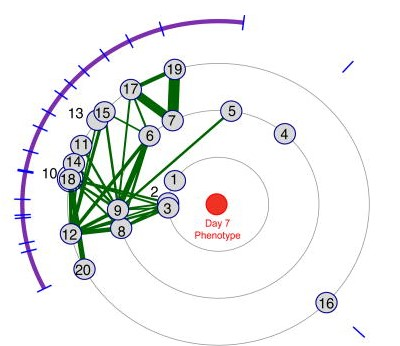Gene signatures related to B-cell proliferation predict influenza vaccine-induced antibody response.
Vaccines are very effective at preventing infectious disease but not all recipients mount a protective immune response to vaccination. Recently, gene expression profiles of PBMC samples in vaccinated individuals have been used to predict the development of protective immunity. However, the magnitude of change in gene expression that separates vaccine responders and nonresponders is likely to be small and distributed across networks of genes, making the selection of predictive and biologically relevant genes difficult. Here we apply a new approach to predicting vaccine response based on coordinated upregulation of sets of biologically informative genes in postvaccination gene expression profiles. We found that enrichment of gene sets related to proliferation and immunoglobulin genes accurately segregated high responders to influenza vaccination from low responders and achieved a prediction accuracy of 88% in an independent clinical trial. Many of the genes in these gene sets would not have been identified using conventional, single-gene level approaches because of their subtle upregulation in vaccine responders. Our results demonstrate that gene set enrichment method can capture subtle transcriptional changes and may be a generally useful approach for developing and interpreting predictive models of the human immune response.
Authors
Yan Tan; Pablo Tamayo; Helder Nakaya; Bali Pulendran; Jill P Mesirov; W Nicholas Haining
External link
Publication Year
Publication Journal
Associeted Project
Systems Vaccinology
Lista de serviços
-
Gene regulatory and signaling networks exhibit distinct topological distributions of motifs.Gene regulatory and signaling networks exhibit distinct topological distributions of motifs.
-
Gene signatures of autopsy lungs from obese patients with COVID-19.Gene signatures of autopsy lungs from obese patients with COVID-19.
-
Network Medicine: Methods and ApplicationsNetwork Medicine: Methods and Applications
-
ACE2 Expression Is Increased in the Lungs of Patients With Comorbidities Associated With Severe COVID-19.ACE2 Expression Is Increased in the Lungs of Patients With Comorbidities Associated With Severe COVID-19.
-
Drug repositioning for psychiatric and neurological disorders through a network medicine approach.Drug repositioning for psychiatric and neurological disorders through a network medicine approach.
-
Linking proteomic alterations in schizophrenia hippocampus to NMDAr hypofunction in human neurons and oligodendrocytes.Linking proteomic alterations in schizophrenia hippocampus to NMDAr hypofunction in human neurons and oligodendrocytes.
-
In-depth analysis of laboratory parameters reveals the interplay between sex, age, and systemic inflammation in individuals with COVID-19.In-depth analysis of laboratory parameters reveals the interplay between sex, age, and systemic inflammation in individuals with COVID-19.
-
The evolution of knowledge on genes associated with human diseasesThe evolution of knowledge on genes associated with human diseases
-
Network vaccinology.Network vaccinology.
-
Pyruvate kinase M2 mediates IL-17 signaling in keratinocytes driving psoriatic skin inflammationPyruvate kinase M2 mediates IL-17 signaling in keratinocytes driving psoriatic skin inflammation
-
Transcriptome analysis of six tissues obtained post-mortem from sepsis patientsTranscriptome analysis of six tissues obtained post-mortem from sepsis patients
-
Gene Signatures of Symptomatic and Asymptomatic Clinical-Immunological Profiles of Human Infection by Leishmania (L.) chagasi in Amazonian BrazilGene Signatures of Symptomatic and Asymptomatic Clinical-Immunological Profiles of Human Infection by Leishmania (L.) chagasi in Amazonian Brazil
-
In vitro morphological profiling of T cells predicts clinical response to natalizumab therapy in patients with multiple sclerosis.In vitro morphological profiling of T cells predicts clinical response to natalizumab therapy in patients with multiple sclerosis.
-
Integrative immunology identified interferome signatures in uveitis and systemic disease-associated uveitis.Integrative immunology identified interferome signatures in uveitis and systemic disease-associated uveitis.
-
Gene regulatory networks analysis for the discovery of prognostic genes in gliomas.Gene regulatory networks analysis for the discovery of prognostic genes in gliomas.
-
Revealing shared molecular drivers of brain metastases from distinct primary tumors.Revealing shared molecular drivers of brain metastases from distinct primary tumors.

